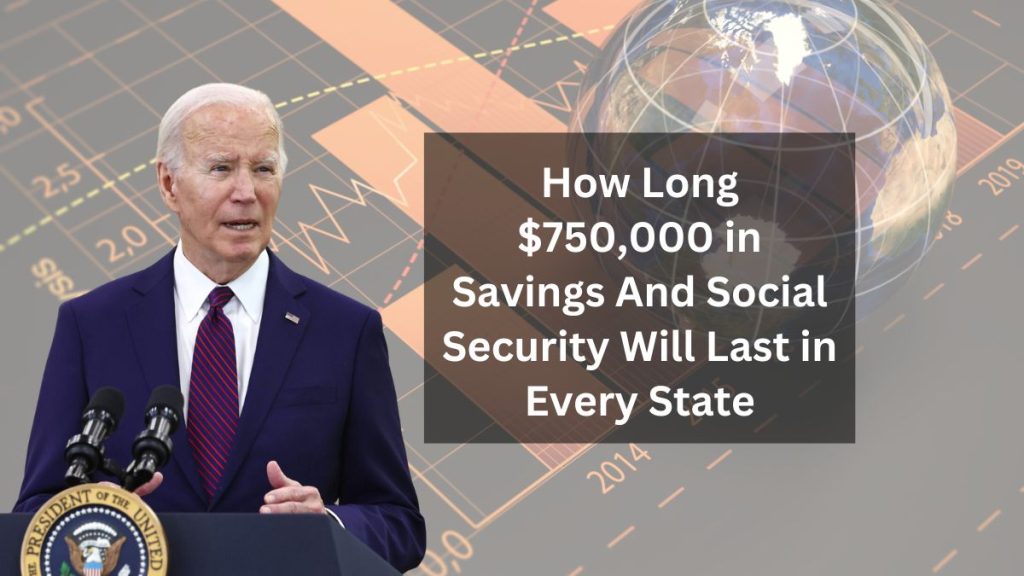Planning for retirement can be daunting, especially when considering how long your savings will last. A common question retirees ask is how long a nest egg of $750,000, combined with Social Security, will last depending on where they live.
The answer varies significantly across states due to differences in living costs, taxes, healthcare, and housing. In this guide, we’ll explore how long $750,000 in savings plus Social Security can last in various states and provide insights to help you make an informed decision.
Factors Influencing Longevity of $750,000 in Retirement Savings

Several factors determine how long your retirement savings will last:
- Cost of Living: States with lower costs of living allow retirees to stretch their savings longer.
- Tax Environment: States with favorable tax policies for retirees (e.g., no income tax on Social Security) can help preserve savings.
- Healthcare Costs: Medical expenses are a significant factor in retirement, varying by state.
- Housing Expenses: The cost of housing, whether owning or renting, can significantly impact savings.
- Annual Expenditure: The total amount you spend annually, including Social Security, determines how long your savings last.
States Where Your $750,000 Will Last the Longest
Certain states allow retirees to stretch their retirement savings far due to their low cost of living and favorable tax policies. Here are the top 10 states where $750,000, plus Social Security, can last the longest:
| State | Years $750,000 Will Last | Annual Expenditure | Annual Expenditure After Social Security |
|---|---|---|---|
| West Virginia | 28.80 | $48,451 | $26,038 |
| Oklahoma | 27.23 | $49,955 | $27,540 |
| Kansas | 26.73 | $50,475 | $28,061 |
| Alabama | 26.29 | $50,938 | $28,524 |
| Mississippi | 26.19 | $51,053 | $28,639 |
| Missouri | 26.08 | $51,169 | $28,755 |
| Arkansas | 26.08 | $51,169 | $28,755 |
| Iowa | 25.27 | $52,094 | $29,680 |
| Tennessee | 25.17 | $52,210 | $29,796 |
| Indiana | 25.17 | $52,210 | $29,796 |
States Where Your $750,000 Will Run Out the Fastest
In contrast, some states have a much higher cost of living, resulting in a shorter longevity for your retirement savings. Here are the 10 states where $750,000 and Social Security will last the shortest:
| State | Years $750,000 Will Last | Annual Expenditure | Annual Expenditure After Social Security |
|---|---|---|---|
| Hawaii | 8.80 | $107,657 | $85,243 |
| California | 12.21 | $83,836 | $61,422 |
| District of Columbia | 12.26 | $83,605 | $61,191 |
| Massachusetts | 12.29 | $83,431 | $61,017 |
| Alaska | 15.03 | $72,330 | $44,916 |
| New York | 15.38 | $71,174 | $48,760 |
| Maryland | 16.75 | $67,185 | $44,771 |
| Washington | 16.99 | $66,549 | $44,135 |
| Vermont | 17.08 | $66,317 | $43,903 |
| Oregon | 17.22 | $65,970 | $43,556 |
Key Insights: What Affects These Numbers?
- West Virginia tops the list because of its low housing costs and overall affordability. Living costs in the state are about 16% lower than the national average.
- Hawaii, on the other hand, is the most expensive state. With high housing and food costs due to its isolation, Hawaii’s annual expenditure exceeds $100,000, meaning savings deplete more quickly.
- Tax Friendliness: States like Tennessee and Mississippi, which don’t tax Social Security benefits, are particularly good for retirees looking to stretch their savings.
- Healthcare: States with lower healthcare costs, such as Oklahoma and Alabama, offer longer-lasting savings compared to states with higher healthcare expenses like California and New York.
How to Maximize Your Savings
While the state you live in plays a significant role, there are ways to make your savings last longer, regardless of location:
- Delay Taking Social Security: By delaying your Social Security benefits until age 70, you can increase your monthly payments by as much as 24%.
- Reduce Living Expenses: Downsizing your home, cutting unnecessary expenses, and managing healthcare costs are effective ways to prolong the life of your savings.
- Invest Smartly: Consider maintaining some level of investment in your retirement portfolio to generate returns that can help sustain your savings over time.
Conclusion
Deciding where to retire is crucial for ensuring your savings last as long as possible. States with lower costs of living, tax-friendly policies, and affordable healthcare offer the most longevity for your $750,000 in savings plus Social Security.
Whether you choose a state like West Virginia or Tennessee, where your savings can stretch for nearly 30 years, or a more expensive state like Hawaii, planning and making informed decisions can help you enjoy a comfortable retirement.
FAQs
1. How does the cost of living affect retirement savings?
The cost of living, including housing, healthcare, and daily expenses, can significantly impact how long your retirement savings will last. States with lower costs of living allow you to stretch your savings further.
2. Can I make my $750,000 last longer by delaying Social Security?
Yes, delaying Social Security benefits past your full retirement age can increase your monthly benefit by about 8% annually, up to age 70. This can significantly extend the life of your savings.
3. Which state is the cheapest to retire in?
West Virginia is one of the cheapest states to retire in, with low housing costs and overall affordability, allowing $750,000 in savings to last nearly 29 years.
4. Which states tax Social Security benefits?
States like Vermont, Oregon, and California have state taxes on Social Security benefits, making them less tax-friendly for retirees.
5. Can healthcare costs reduce the longevity of retirement savings?
Yes, healthcare costs are one of the most significant expenses for retirees. States with high healthcare costs, such as Hawaii and New York, tend to deplete savings faster.
References
- Federal Reserve’s Survey of Consumer Finances
- Bureau of Labor Statistics’ Consumer Expenditure Survey 2022
- Social Security Administration’s May 2024 Data






